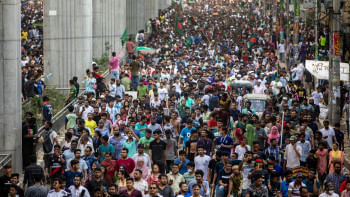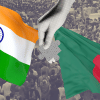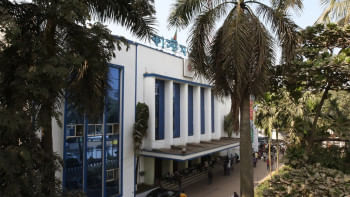Principles, party, power or politics?

There are many takeaways from the sudden fall of Sheikh Hasina and the Awami League government, which for 15 long years projected an air of invincibility. We all know how the AL suppressed dissent and movements that it perceived as threats, often resorting to extreme and criminal measures. Yet, despite the gruesome violence, intimidation, and threats, countless people took to the streets—even on the day Hasina fell—without any guarantee that they would return home alive.
The student movement's ability to inspire people to stand up to a vicious oppressor was truly remarkable. How did the students manage to achieve this? Clearly, the oppressor's behaviour played a significant role. However, the more I hear these young people speak across various media platforms, the more I want to give them credit for the unity we recently witnessed.
As a society, we are divided along many lines. However, what became evident during these protests—especially if you were present in them—was that the majority of Bangladeshis share some core values, such as the sanctity of life, the belief that killing is wrong, a commitment to justice, etc. Through their actions, the students staunchly upheld these principles, inspiring people to unite.
On the day of Hasina's ouster, one of the student coordinators mentioned something interesting on television. When asked if he wanted to see a new Bangladesh where people have freedom of speech, he replied that he wanted people to have the freedom to dissent. The nuanced difference between the two is important. Most of us claim to believe in freedom of speech when it comes to speech we agree with. However, it is precisely how we react to speech we don't agree with that reveals whether our claim is genuine.
All of us claim to believe in justice. However, following the fall of the AL and the vengeful violence that ensued against its activists, these students reminded us of the importance of pursuing justice in a morally and legally correct way. After all, everyone, regardless of their crimes, deserves their day in court, because the concept of "habeas corpus" is a monumentally important civilisational discovery. Equally crucial is the principle of "innocent until proven guilty," which is larger than any individual as it originates from the Magna Carta, a cornerstone of justice for which humanity has paid an immeasurable price. To punish those responsible for the crimes of the AL government in ways that violate these principles would transform us into the very monsters from which we seek to distance ourselves.
The downfall of Sheikh Hasina is a tragic story, not only on a personal level but also for Bangladesh. Regardless of Bangabandhu Sheikh Mujibur Rahman's governance failures, there is no denying his crucial role in our country's independence. Growing up in the 90s, I remember hearing about attempts to erase him from the history books in earlier decades. Yet, the damage that Hasina and her AL have done to Sheikh Mujib's legacy and that of the party is unmatched.
As she and other key AL leaders fled the country, they left thousands of their party activists in a terrible state. This should serve as a warning to us all: when you prioritise a party over principles, you risk facing a similarly tragic fate.
Without downplaying the crimes of Hasina and the AL, one must admit that the other political parties in our country have not proven to be much better. We have seen them attempt similar atrocities and power grabs before. Perhaps the difference is that they never managed to hold onto power for as long, and the state machinery did not have the same capacity to enable them to wield so much power. The longer the AL stayed in power, the more power it acquired.
As the saying goes, "Power tends to corrupt, and absolute power corrupts absolutely." Therefore, we can't say for certain whether another party in AL's position would not have abused it in a similar way. This is why we must reform the structure of our state institutions, so that no party can acquire such unquestioned power again. But how do we do that?
When the student protests were happening, the AL kept trying to connect them with a conspiracy involving BNP and Jamaat. Meanwhile, we in the media and others kept saying these students were "ordinary students" who were "not involved in politics." One of the student coordinators, Sarjis Alam, recently said something interesting.
He said that for years, people avoided getting involved in politics because those engaged in it were seen as corrupt and dishonourable. It is true that politicians in Bangladesh have often been perceived this way—and for good reasons. However, the only way to reform our corrupt political and governance systems is through politics. Therefore, it is crucial for honest people—individuals who do not compromise on their principles—to enter the political arena.
Not only that, as Aristotle said, "Man is a political animal." There is no way around this, because humans are social creatures with the power of speech and moral reasoning—both of which greatly affect the state they live in.
Therefore, if we are to truly become a "democratic society"—within a "republican state structure" that functions properly—ordinary people must also become politically conscious. And there is no reason why this cannot happen.
Since the student movement began until today, ordinary Bangladeshis have shown significant political maturity. Yes, there have been mistakes, and the road ahead will also be filled with pitfalls. However, the people must not believe they can simply hand over the fate of their future to someone else and then go about their business without concerning themselves with politics. If we are to truly have a democratic society where power belongs to the people, then the people themselves must be willing to take responsibility for wielding that power.
For most of our history, those who have wielded power have used it to serve themselves and their parties or to gain even more power and wealth. However, when power is properly utilised, it can inspire hope. That is what the student movement did: it gave people hope for a better future. What happens to that hope now depends on the choices we make. What will we choose? Will we choose to remain politically involved? If so, for what purpose: for power, for party or for principles?
Eresh Omar Jamal is deputy head of editorial at The Daily Star. His X handle is @EreshOmarJamal.
Views expressed in this article are the author's own.
Follow The Daily Star Opinion on Facebook for the latest opinions, commentaries and analyses by experts and professionals. To contribute your article or letter to The Daily Star Opinion, see our guidelines for submission.

 For all latest news, follow The Daily Star's Google News channel.
For all latest news, follow The Daily Star's Google News channel. 











Comments